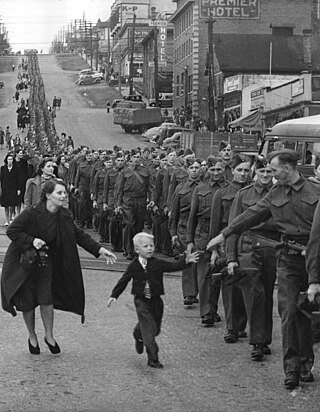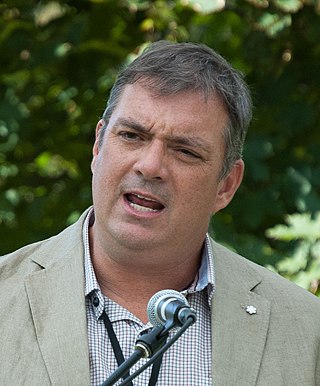
William Lyon Mackenzie King was a Canadian statesman and politician who served as the tenth prime minister of Canada for three non-consecutive terms from 1921 to 1926, 1926 to 1930, and 1935 to 1948. A Liberal, he was the dominant politician in Canada from the early 1920s to the late 1940s. King is best known for his leadership of Canada throughout the Great Depression and the Second World War. He played a major role in laying the foundations of the Canadian welfare state and established Canada's international reputation as a middle power fully committed to world order. With a total of 21 years and 154 days in office, he remains the longest-serving prime minister in Canadian history.

The Conscription Crisis of 1917 was a political and military crisis in Canada during World War I. It was mainly caused by disagreement on whether men should be conscripted to fight in the war, but also brought out many issues regarding relations between French Canadians and English Canadians. Almost all French Canadians opposed conscription; they felt that they had no particular loyalty to either Britain or France. Led by Henri Bourassa, they felt their only loyalty was to Canada. English Canadians supported the war effort as they felt stronger ties to the British Empire. On January 1, 1918, the Unionist government began to enforce the Military Service Act. The Act caused 404,385 men to be liable for military service, from which 385,510 sought exemption.
The Conscription Crisis of 1944 was a political and military crisis following the introduction of forced military service for men in Canada during World War II. It was similar to the Conscription Crisis of 1917, but not as politically damaging.
Jack Lawrence Granatstein is a Canadian historian who specializes in Canadian political and military history.
David Jay Bercuson is a Canadian labour, military, and political historian.

Lieutenant General Eedson Louis Millard "Tommy" Burns, was a senior officer of the Canadian Army and a diplomat. He saw active service in both World War I and World War II. He served as the first commander of the first United Nations peacekeeping force in 1956. His military career in war has, for the most part, been criticised by some historians as showing he was "simply incapable of commanding a higher formation."
Desmond Dillon Paul Morton (1937–2019) was a Canadian historian and political advisor who specialized in the history of the Canadian military, as well as the history of Canadian political and industrial relations.

General Henry Duncan Graham Crerar was a senior officer of the Canadian Army who became the country's senior field commander in the Second World War as commander of the First Canadian Army in the campaign in North West Europe in 1944–1945. A graduate of the Royal Military College of Canada, in Kingston, Ontario, Crerar was commissioned as a lieutenant in the Non-Permanent Active Militia in 1909, serving with the 4th Battery, Canadian Field Artillery, which was based in Hamilton, Ontario. He rose to the rank of lieutenant-colonel in the artillery in the First World War, during which he was mentioned in despatches and made a member of the Distinguished Service Order (DSO). Electing to remain in the army as a professional soldier after the war, he attended the Staff College, Camberley, from 1923 to 1924, and the Imperial Defence College in 1934. He was appointed Director of Military Operations & Military Intelligence in 1935 and Commandant of the Royal Military College of Canada in 1939.

Lieutenant-General Kenneth Stuart was a senior Canadian Army officer who saw active service during both the First World War and, later, the Second World War. During the latter conflict, he served as Chief of the General Staff (CGS), the head of the Canadian Army, from December 1941 until December 1943, but he is perhaps most remembered today for his role in the Conscription Crisis of 1944.

During the World Wars and Interwar Years, 1914–1947, Canada experienced economic gain, more freedom for women, and new technological advancements. There were severe political tensions over issues of war and ethnicity, and heavy military casualties. The Great Depression hit Canada hard, especially in export-oriented mining and farming communities, and in urban factory districts.

This is a bibliography of major works on the History of Canada.

The Valour and the Horror is a Canadian television documentary miniseries, which aired on CBC Television in 1992. The series investigated three significant Canadian battles from the Second World War and was a co-production between the CBC, the National Film Board of Canada (NFB) and Galafilm Inc. The films were also broadcast by Radio-Canada, the French network of the CBC. The series was written by Brian McKenna, an award-winning journalist and founding producer of The Fifth Estate and his brother, Terence McKenna, and was directed by Brian McKenna.
Canada has been a member of the North Atlantic Treaty Organization (NATO) since its inception in 1949.

Canada and the Federal Republic of Germany have positive relations, as they are close allies and fellow NATO and G7 members.

Whose War Is It? is a non-fiction book by Jack Granatstein, a Canadian historian and military veteran. It critiques several aspects of Canadian politics, foreign policy and national defense, including Canadian involvement in United Nations peacekeeping missions, Canadian national interests, Canada – United States relations, the state of the Canadian Arctic, Quebec pacifism and Canada's policy of multiculturalism.

Tim Cook is a Canadian military historian and author. Cook is an historian at the Canadian War Museum and the author of thirteen books about the military history of Canada. Having written extensively about World War I, Cook's focus shifted to Canada's involvement in World War II with the 2014 publication of the first volume in a two-volume series chronicling Canada's role in that war. He is a two-time recipient of the C.P. Stacey Prize, a two-time recipient of the J.W. Dafoe Book Prize, and a three-time winner of the Ottawa Book Prize. He was elected to the Royal Society of Canada in 2019. He is a member of the Order of Canada.

Death by Moonlight: Bomber Command is an episode of the 1992 Canadian The Valour and the Horror television documentary miniseries, and was a co-production between the Canadian Broadcasting Corporation (CBC), the National Film Board of Canada (NFB) and Galafilm Inc. The series investigated three significant Canadian military engagements from the Second World War with Death by Moonlight: Bomber Command dealing with the experiences of Canadian pilots in the RAF Bomber Command.

The Dorchester Review, founded in 2011, is a semi-annual journal of history and historical commentary that describes itself as a non-partisan but "robustly polemical" outlet for "elements of tradition and culture inherent to Canadian experience that fail to conform to a stridently progressivist narrative."

Who Killed Canadian History? is a 1998 book by Canadian historian J. L. Granatstein. The book argues that Canadians lack national unity because of their failure to teach their country's history. Granatstein contends that multiculturalism, social historians and weak history teaching standards are responsible for Canada's lack of a historical narrative. He advocates for a greater emphasis on the study of Canadian history in schools and university history departments, especially political and military history.














